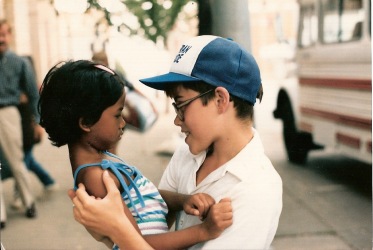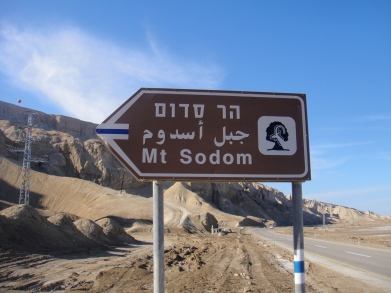Texts: Genesis 18:20-32 + Psalm 138 + Colossians 2:6-19 + Luke 11:1-13

When we were young my sister, Tara, was an unabashed beggar. She’d beg for anything, though the thing I remember most was how she always asked for everyone’s leftover change. If I emptied my pockets, putting my keys and spare change on the table, I could count on her to ask, “Erik, can I have your change?” If there was a bowl or jar of pennies, nickels and dimes, she’d ask, “Erik, can I have your coins?” It was both predictable and disproportionately irritating. I say disproportionately because all I had to do was say no (a few times) and the conversation was over. I didn’t really have to worry that she’d steal my change, that wasn’t her thing. She just kept asking for it.
Being older now and looking back, I try to understand why it bothered me so much, her begging. I think about how very young children don’t fully understand the idea of ownership. Granted, once they learn the word “mine,” it’s all you hear for a while, but that doesn’t mean they’ve mastered the concept. They’ve simply gone from a state of complete dependency on a parent or guardian to feed and clothe and protect them, to a new state of awareness that they can use those little hands of theirs to grasp and bring objects closer to themselves. That first “mine” is, in all likelihood, a mimicked word. The toddler grabs something they see and want, and someone with a little more language says, “no, that’s mine” and takes it away. After a few repetitions, the child learns “mine” is what you says when you want to keep something to yourself. It’s an unsophisticated understanding of the concept of personal property, but it’s not wrong.
Later the child will learn that there are other rules in the game of ownership. They will learn that things have owners, and later that before they have owners they have makers. They will learn that things can be traded for one another, and later that things can be traded for money which can then be traded for other things. Hopefully they will learn that even those things which are theirs, which have been given to them, are also supposed to be shared. We’ve all seen children struggle with this rule in the ownership game. “They won’t share with me” is the aggrieved cry of the child who really wants to claim something as “mine,” but has begun to learn that some things are not, in fact, theirs. Soon parents will be stepping in to mediate, coaching their children in what is actually a very complicated social interaction — affirming the right of ownership while also establishing the expectation of generosity. “You have to ask before you take things” is balanced with “you need to share” or “you need to take turns.”

I’m pretty sure I was a covetous child. I always had an eye out for other children’s toys. I once devised a scheme to get the neighbor boy across the street to leave his action figures in our family’s garage by describing it as a “clubhouse” for kids on the block, where we could all pool our toys and enjoy access to a larger collection. It was my first stab at collective ownership. His mother was unconvinced and the action figures returned to their home before dinner on the first day. I was trying to add new “house rules” to the ownership game, trying to enlarge the pool of things I could call “mine.”
I think what irritated me so much about my sister’s begging is that it was a pure appeal to my under-developed generosity. She didn’t try to earn my spare change, and she didn’t try to take it or convince me that it was hers. She just kept asking for it — pushing against my sense of private ownership. What was I really going to do with those quarters and dimes? I don’t know. It’s just that they were mine.
As our call to worship reminded us this morning, and contrary to the prevailing opinion during my adolescence, the sins of Sodom and Gomorrah were not sexual, but economic. This morning’s passage from Genesis immediately precedes the more well-known story of the divine travelers who come to Sodom in the evening, expecting hospitality, only to find a city dominated by rapacious appetites, unwilling to show them the generosity that was, by custom, their due. In ancient times, and today as well, those who traveled the open road were especially vulnerable to wild animals, bandits and robbers. It was a basic expectation that you would show hospitality to the wayfarer, to those who traveled, precisely because they were at-risk; and, of course, by doing so you strengthened the fabric of the safety net that would also protect you and your family should you ever find yourselves out on the road in need of hospitality. As the Torah says, “don’t mistreat or oppress an immigrant, because you were once immigrants in the land of Egypt.” (Ex. 22:21, CEB)
The people of Sodom and Gomorrah, however, were known for their greed, for their disregard for the poor and the vulnerable. The prophet Isaiah called them hypocrites because they worshipped God without seeking justice for God’s people (Isa. 1:10-17). The prophet Ezekiel condemned them for their arrogance and their displays of wealth in the presence of the needy (Ezek. 16:49). The prophet Amos named their greed for what it was, calling them oppressors of the poor (Amos 4:1,11).
And yet Abraham prayed for them. “Suppose there are fifty righteous within the city,” he pleads with God. “Will you then sweep away the place and not forgive it for the fifty righteous who are in it?” (Gen. 18:24) Then he whittles away at the minimum threshold of righteousness, getting God to agree to spare Sodom if there are even 45, and then 40, and then 30, and then 20, and then 10. The scene is obviously comedy, but Abraham’s mercy is no joke.
We’ve just come through a pretty rough week in America, the latest in a series of rough weeks. As the leaders of our nation gather in conventions to play their zero-sum game, the voices of prophetic condemnation on both sides are louder than ever. Father Abraham’s voice is hard to hear. Where is the call for mercy, for forbearance, for recognition that no community can be reduced to the stereotypes and stories we choose to tell about them? That Black lives and Blue lives and people on both sides of every border are more than the single thing we choose to see when battle lines are being drawn. How will we act, how would we hope to be judged, if there are only ten, or five, or even just one righteous person in the crowd of people we can no longer tolerate?
The humor of the scene between Abraham and God in Genesis is that it’s like watching the child teach the parent a lesson — which actually happens all the time, right? Abraham pleading with God to be God, to be generous, to be loving, to be forgiving, as God always is because it is God’s nature. Abraham doesn’t assert his right to exact this favor from God on the basis of the faith he has already shown. Abraham doesn’t try to make a trade in exchange for the life of the Sodomites. He just begs for God to be the God he has known.
And it is this beggar’s prayer that Jesus teaches us: Give us and forgive us, and do not judge us in accordance with our actions, but with your mercy.

Whenever I pray the Lord’s Prayer, and I arrive at the petition for daily bread, what I hear is: “Give us this day our daily bread.” I hear the emphasis on daily, because I am rich. I live in the land of bread, and there’s always food in my fridge, and I need to be reminded to let go of my coins and share all those good gifts with which God has blessed me and my family. In this way, I guess I am a Sodomite, as are many of us who take our wealth and privilege for granted.
But the petition can also be read: “Give us this day our daily bread.” Like my sister asking for my spare change. Like man at the end of the off-ramp, who also dines at Community Dinners on Wednesday nights, who musters up the courage each minute of each hour of each day to assert his basic humanity and to ask me to do the same. Give it to us, not because we’ve earned it, or because we can take it from you, but because you have it and I need it and we are part of the same safety net.
Jesus teaches us to pray like beggars, and like Abraham — to pray as though we are dealing with a God who can be counted on to show mercy and forgiveness. Like we are dealing with a God who will not bring us to the time and trial and deal with us according to our miserable selfishness, but in accordance with God’s own limitless generosity. Jesus teaches us to pray like beggars so that we might learn to share what has already been shared with us, and also so that we might condition our hearts to expect something new and good and hopeful for our futures. For surely if we can acknowledge that we ourselves rely upon God, then we will stop punishing those whose own utter reliance is more plain to see. Surely. And if we can all acknowledge that we are, in Martin Luther’s words, “mere beggars showing other beggars where to find bread,” then we can treat those with whom we so violently disagree with a little more mercy, a little more patience, and a little more forgiveness.
Amen.